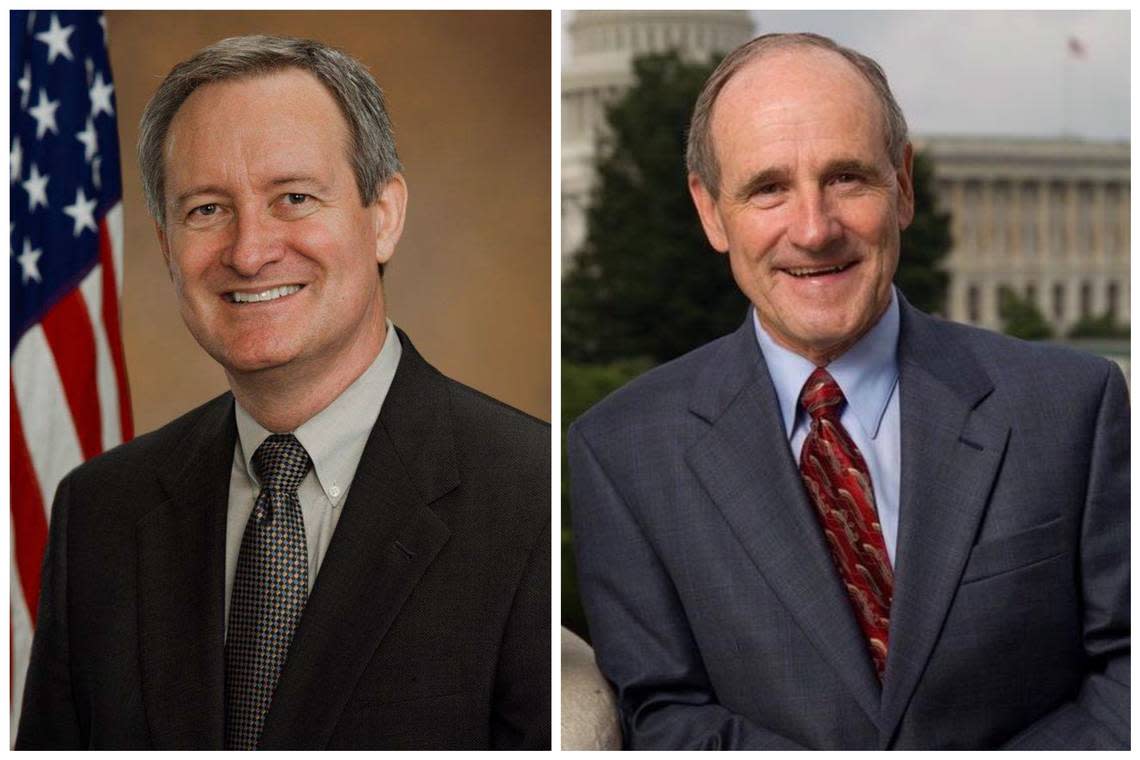Republicans recaptured the US House majority in midterms. What could that mean for Idaho?
Idaho congressmen are expected to achieve greater standing next session after midterm election results delivered the Republican Party the U.S. House majority for first time since 2018.
The state’s four Republicans in Congress hold their party’s top position on several influential committees that help steer the course of U.S. policymaking. For Idaho’s two House members, their clout in those roles is set to expand, while Democrats continue to maintain control of the Senate in the newly split Congress next year.
Rep. Mike Simpson, who recently won his 13th term in the seat, sits on the House Appropriations Committee, which guides U.S. fiscal policy. With Republicans returning to power in Congress’ lower chamber, he’ll chair one of its subcommittees and have a heavier hand in where the U.S. spends its budget over at least the next two years.
Democrats have held the majority in both chambers the past two years and worked in concert with Democratic President Joe Biden’s administration to pass several major spending packages, which Republicans argue has contributed to record inflation. The bills included trillions committed to improving the nation’s infrastructure, advancing its technological and domestic supply chains and transitioning away from the use of fossil fuels to reduce carbon emissions.
Simpson, 72, of the 2nd Congressional District that represents East Idaho and most of Boise, told the Idaho Statesman that ending “extravagant spending” during the past few years will be his and other House Republicans’ leading priority to stabilize the U.S. economy.
“One of the ways to address inflation is to reduce spending,” Simpson said in a phone interview on Election Day. “That’s going to be really tough — and it’s always tough — but that’s what’s going to happen in the next two years.”
But Simpson also welcomed a return of the two parties working together in what will remain a deeply divided nation, as illustrated by the slim party majorities in each chamber following the election. He called for additional oversight of the Biden administration, while labeling demands from some of his party’s most conservative members to impeach the president “just crazy talk.”
Simpson is the longest continuously serving congressman in state history. He cautioned against the ongoing rhetoric and tit-for-tat partisanship in Washington, D.C., that have driven a wedge between Democrats and Republicans during the past two presidential administrations.
“The prediction of the great red wave didn’t happen,” he said of Republicans failing to have the dominant midterm election performance projected by some party members and pundits. With “the House majority, we can pretty much do anything. It doesn’t mean that’s what we should do. We still need to reach across the aisle to find bipartisan solutions.”
Charlie Hunt, political science professor at Boise State University, studies Congress. With Republicans taking the House, he said that Simpson’s position on the Appropriations Committee could be pivotal — including for locking down federal grant funding in his congressional district, as well as across the state.
“Majority control is not everything, but it’s close to everything, and that includes who chairs these committees,” Hunt told the Statesman by phone. “You control the agenda, and what kinds of bills go through and not go through. And the Appropriations Committee, most agree that it’s the most powerful committee in the House. It’s the power of the purse, and it matters a whole lot in Congress.”
Sen. Mike Crapo, R-Idaho, like Simpson has served in his position since 1999 and won another term this month. Even outside of the majority in Congress’ upper chamber, he likewise plays a key role on the U.S. fiscal front as the top Republican on the Senate Finance Committee.

Crapo, 71, told the Statesman that getting federal spending under control should be a primary focus, regardless of who ended up in the Senate majority. Democrats will maintain that position for at least the next two years.
“Inflation remains at near-record highs, and a majority of Americans identify inflation and the economy as their No. 1 concern,” Crapo said by email. “This is the result of trillions of dollars in partisan spending overheating an economy that was already rebounding from the pandemic, forcing the Federal Reserve to use its tools to combat inflation. For its part, Congress should focus on pro-growth policies that unleash American energy, cut the red tape of burdensome regulations and stop unrestrained government spending.”
‘Can’t just yell at the train’
For Sen. Jim Risch, R-Idaho, the top Republican on the Foreign Relations Committee, his status and approach will go unchanged with Democrats holding the Senate through at least the end of Biden’s current term in 2024. Risch, 79, isn’t up for reelection again until 2026.
“Broadly speaking, with no change to which party controls the U.S. Senate, Sen. Risch’s priorities and focus remain the same,” Risch spokesperson Marty Boughton told the Statesman by email. She cited curbing large-scale spending packages, countering China and strengthening U.S. energy and mineral security as Risch’s main areas of attention.

Because the Senate contains many fewer members than the House, Hunt said the party in power matters less for crafting legislation at the committee level. Instead, the ability to influence policy more often is based on more collegial, personable relationships. Risch’s experience on the committee could be instrumental, as the U.S. is forced to continue managing its worsening relations with China and the ongoing Russia-Ukraine war, among a host of other international challenges in the coming years.
Taking on the chair position in either chamber, rather than operating as the minority party’s ranking member, can be a double-edged sword, Hunt said — a potential cautionary tale of shouldering the burden of power, and the expectations that come with it. That may prove true next session for Simpson, as well as Republican Rep. Russ Fulcher, of Idaho’s 1st Congressional District, who voters just awarded a third term in the House.
“You can’t just yell at the train as it’s going by. You have to be on the train and make sure it stays on tracks,” Hunt said. “You kind of have accountability now, and the responsibility of passing things through.”
Fulcher, 60, serves on the Education and Labor and Natural Resources committees. He is the top Republican on subcommittees for both — civil rights and human services, and national parks, forests and public lands — for which he could become chair with the House Republican majority.
Fulcher’s congressional district represents western and North Idaho. Through his congressional spokesperson, Fulcher declined to comment Friday, wanting to wait until committee assignments are finalized.

Even so, Hunt noted Fulcher lacks the same influence in the House as Simpson, but also appeals to a different electorate and has other allegiances as the more conservative lawmaker. With the Republican majority, Fulcher could carve his own path as he begins establishing himself as a tenured member of the lower chamber, perhaps in aspiring to one day succeed Risch or Crapo as they get closer to retirement, Hunt said.
“Members of Congress, they are politically motivated and care about legacy, and really care where they land,” Hunt said. “I’d be surprised if he didn’t have one eye, if not both eyes, on a future” in the Senate.
